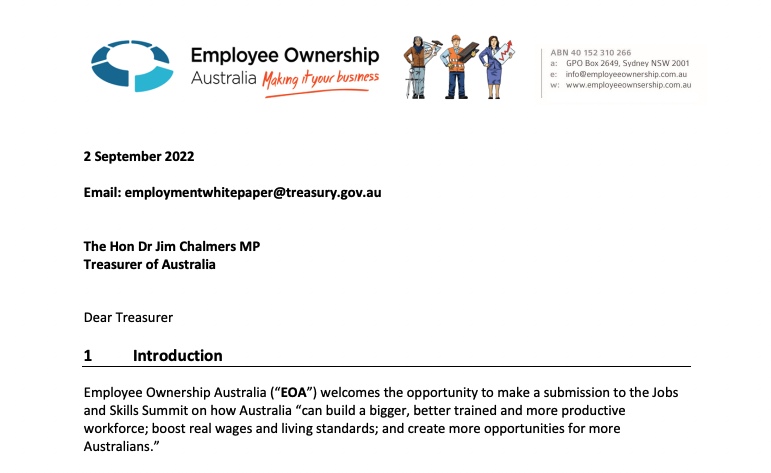> Download EOA’s submission to the Jobs and Skills Summit
Employee Ownership Australia believes widespread employee ownership will boost job security and wages, grow productivity, lift participation in the labour market, deliver a high-quality labour force and allow for full employment to be maintained nationally.
Our submission provides substantial examples of the ways in which employee ownership can achieve these aims, and highlights that many of the identified issues relating to the labour force in Australia can be addressed through better aligning the interests of employers and employees.
We believe that the provision of employee ownership can be an important element in the effective development of opportunities for employment and growth.
It is especially important in the current environment where it can play a key role in maintaining continuing employment opportunities, especially as baby boomer businesses move into succession mode.
– Andrew Clements, Chair at Employee Ownership Australia
The success of employee ownership around the world – as this submission indicates – can be shown to be positively measured against many of the main themes identified in the issues paper: boosting job security and wages, growing productivity, lifting participation in the labour market, delivering a high-quality labour force and allowing for full employment to be maintained.
Increased productivity, job security, wage growth and skilled labour are all inherent bonuses of employee ownership, and are key components underpinning the success of employee ownership businesses and their performance.
As Prime Minister Anthony Albanese stated at his recent address to the National Press Club, the Jobs and Skills Summit is evidence of the government’s willingness “to embrace the need for real reform, to solve widespread skills shortages that act as a handbrake on our economy, to remove the barriers that prevent people entering the workforce, [and] to make sure productivity gains translate into rising incomes for Australians.”
He also stated that it is the shared responsibility and common interest of unions, industry, small business, government and community groups to build “a stronger, fairer and more productive economy”.
Employee owned businesses provide a solution and an avenue for such reform, to enable Australia to “build a bigger, better trained and more productive workforce; boost real wages and living standards; and create more opportunities for more Australians.” (Source).
EOA was formed in July 2011 to ensure ongoing advocacy for broad based employee ownership and dynamic workplace participation in Australian companies
It engages with and assists companies that have or aim to implement employee ownership or employee share plans, whilst also being a key advocacy body for broad based employee ownership. EOA is independent and entirely member funded, and is the only independent, dedicated advocacy and education group in this space in Australia.
Join the next EOA Experts Panel webinar
Over the course of 2022 the EOA Experts Panel has been holding a series of webinars where you can learn more about employee ownership. Our next webinar will be presented by guest expert Corey Rosen, Ph.D., founder and senior staff member of the National Center for Employee Ownership (NCEO).
In their new book, Ownership: Reinventing Companies, Capitalism, and Who Owns What, John Case and Corey Rosen make the argument that capitalism is broken. Wealth has concentrated while wealth insecurity has soared. Public companies are focused almost solely on the short term, while private equity firms focus on buying and flipping firms in just a few years. Both concentrated wealth in the hands of the very few.
There have been lots of proposals to fix the system, but few both have a proven track record and are politically practical. Employee ownership is one way to fix the system by keeping the virtues of the free market but spreading ownership more broadly. This presentation will look at how we can move forward to make employee ownership and similar practical ideas the norm, not the exception.

